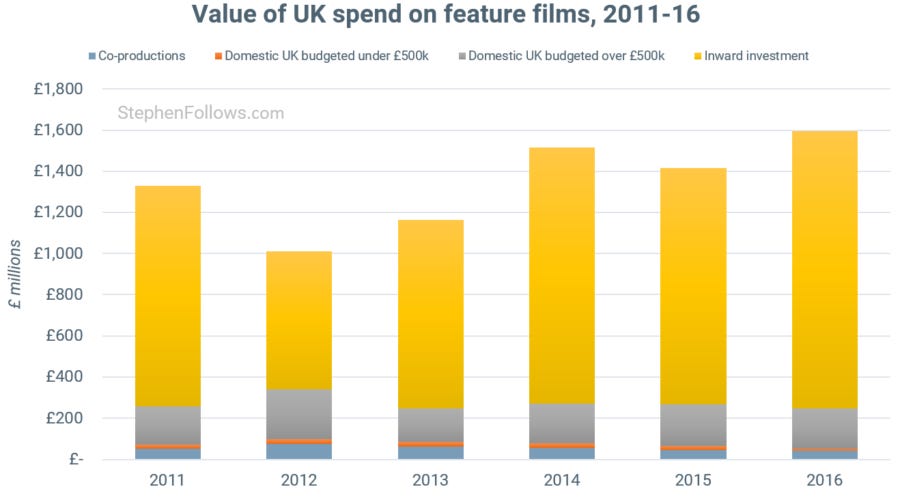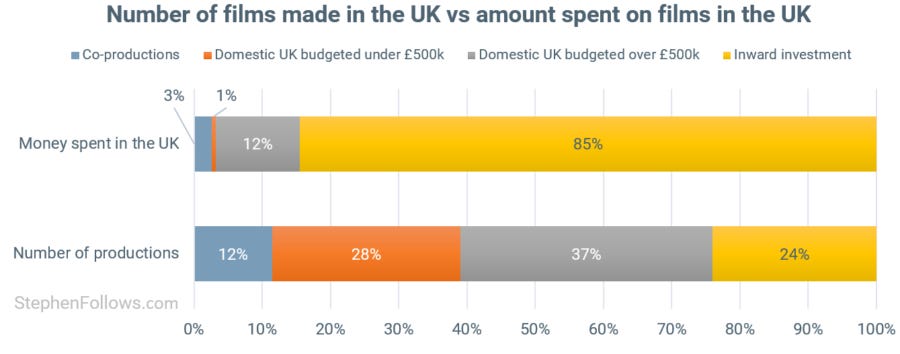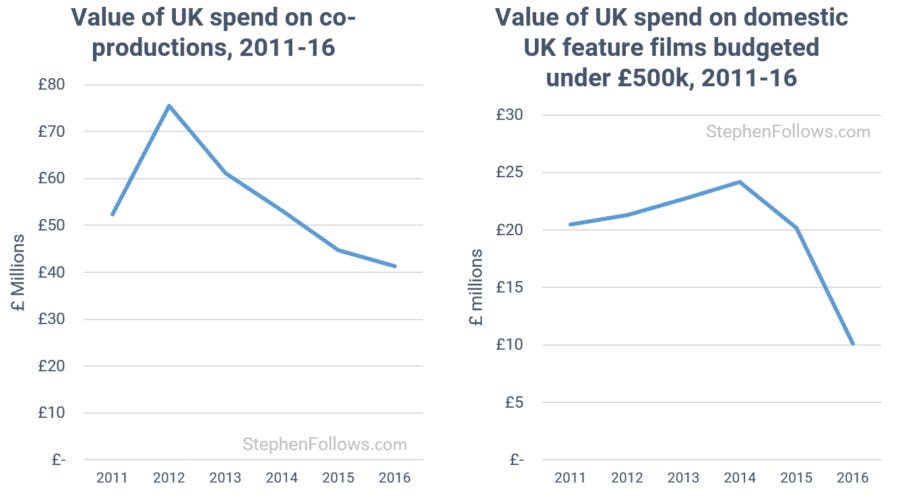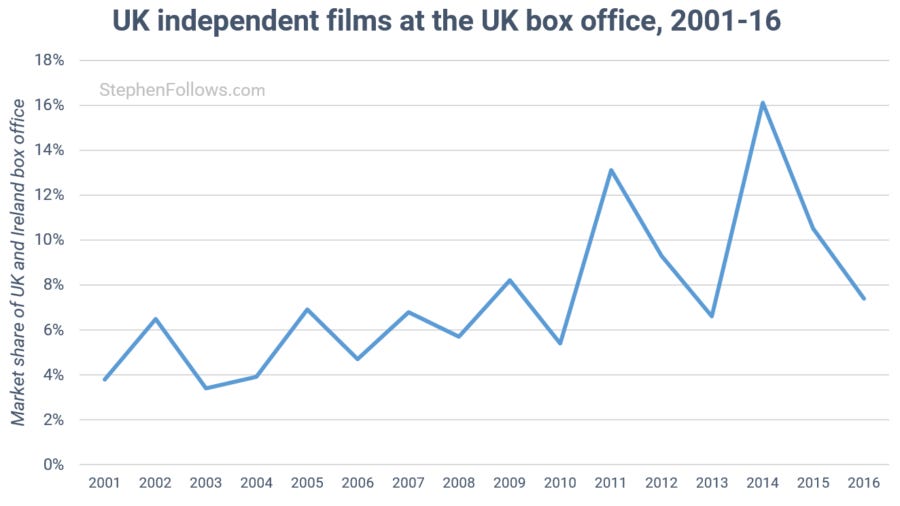The state of the UK film industry
The newspapers last week featured headlines like "UK film production break[s] records" and "Star Wars punches London film industry past light speed". This led to a number of people contacting me to ask if the overall message was true - is the UK film industry really doing as well as is being claimed?
Most of the messages came from independent British filmmakers who were either sceptical at the claim that all was rosy in UK film, or who thought that the numbers were being cooked to make things look better than they are.
The first thing to note is that I don't doubt for a moment that the data is correct. The BFI does a terrific job at collecting the raw data, and it would be extremely hard (if not impossible) for them to provide false figures on any scale to affect the overall picture.
Perhaps some of the cynicism is due to the spin from senior staff and politicians that normally accompanies such data releases. Today, I'm not going to focus on who said what, but instead look at the numbers that were released and address why some filmmakers feel they don't match their experiences.
What data was released?
The headlines were generated by a new set of BFI statistics which relate to production levels in 2016. Last year saw £1.6 billion being spent in the UK on feature films, a 13% increase on 2015 and the highest since records began in 1994.

A tale of two perspectives
If the amount spent in the UK is so high, why the scepticism? I suspect it's because of a shift in the UK film production economy and a lack of connection between different corners of the industry. If you choose to measure the health of the UK film industry by the total amount spent in the UK, then things are booming, as we saw above. However, if you instead choose to look at the small, independent domestic productions then things are a little more worrying.
The vast majority of the money spent in the UK went on just a handful of productions, including the new Star Wars film The Last Jedi, the new Transformers instalment The Last Knight and the new Superman / Batman crossover Justice League (hopefully the last one).

When we look again at the data in the first chart in this article, we can see that the amount spent in the UK on co-productions and low-budget films has halved in just four years, from £76m to £41m for co-productions and £21m to £10m for low-budget films.

Smaller UK films are experiencing a sharp decline in both numbers and amount of money spent. I wrote a piece on this decline in UK production in 2015 and the following week shared the thoughts of various professionals and industry watchers.
Reasons for UK indie filmmakers to be cheerful
However, I don't think it's all doom and gloom for indie filmmakers.
Firstly, the decline is coming from a relativity high base (i.e. the micro-budget boom we saw in the late 2000s, which led to a high in 2010).
Secondly, fewer films being made is not automatically a bad thing. Almost everyone in the industry agrees that the massive increase in film production levels over the past few decades has presented new problems. Between 1994 and 2010, UK domestic features increased nine-fold, but the opportunities to release such films has not kept pace.
Finally, there is another trend which I would encourage filmmakers to focus on. The share of UK box office going to indie UK films has increased significantly over the past decade. It's not a consistent rise, but even though the 2016 figure was a decline on most recent years, it is still twice what is was in 2001.

Top UK independent films
To help you see what this looks like, here are some of the top performing independent UK films, at the UK box office.

[table id=94 /]
Notes
The data today comes from the BFI, ComScore and the Film Distributors Association. Some of the films in the table were still on release when the numbers were crunched so their final total could be slightly higher. The figures for the "UK box office" relate to the film territory which includes both the UK and Ireland.
If you would like to know more about this topic, I highly recommend checking out the research and statistics publications created by the BFI. You can see a full list of their past publications here and a schedule for what's to come here.
Epilogue
When trying to definitively measure "the state of the UK film industry" we come up against a similar problem to the Coastline Paradox. The paradox refers to the complexity in trying to measure the coastline of a country because you have to decide what level of detail you're going to use. An A4-size map of the UK will miss off many of the finer details of the coastline, meaning that your final measurement of the coastline length will be shorter than if you'd used a larger map. Larger maps will show more detail, but you will not reach the 'perfect' size until you're looking at one-to-one real life scale - at which point you're going to struggle to measure anything!
The same can be said for UK film. You can start with a simple model of what constitutes a "British film", such as all films shot in the UK or passing the Cultural Test. "But..." someone will complain "... you can't include massive American studio movies like 'Jason Bourne' when you're looking at UK films!" So we focus in on films which were not backed by a Hollywood studio. "But..." someone else decries "... you can't include films like 'Paddington' when looking at the true UK film industry as it has big stars, a huge existing audience and $50m budget!" And so on.
In truth, there is not one thing which we can neatly define as "The UK Film Industry". Your opinion of what should and shouldn't be included depends on your point of view and where you sit in the industry. And I often find people get quite irate when you include films they don't regard as 'their own'.
My two cents is that the BFI is broadly right - things are looking very good for UK film. We have a stable tax system which is attracting lots of foreign money and we have the people and facilities needed to make films of all levels. The fall in the number and value of low-budget films probably has more to do with the micro-budget boom five years ago than some kind of collapse of the independent sector.
At the end of the day, nothing is going to stop us Brits thinking the worst of any situation, and least of all data. And I think this is awful, unfixable and we should all just give up.


